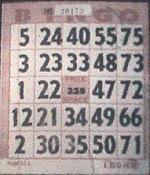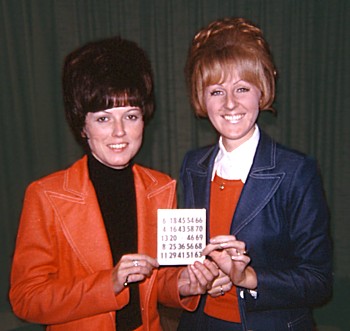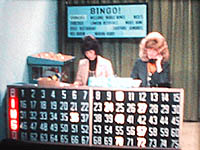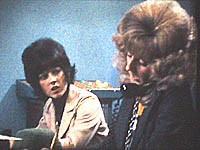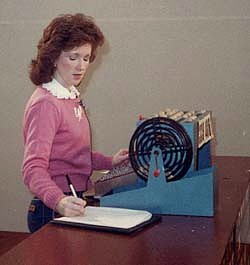Cable
TV Bingo
Written
March 16, 2001
|
|
When I was a young man, I worked at three local cable television systems: first in Marion, Ohio, then in Washington, Pa., and finally in New Kensington, Pa. And every one of them had a Bingo show at one time or another. Sometimes, I even got to be the star! |
By FCC mandate, local cable systems had to start producing their own local programs in 1970. That was the year that I entered the job market, so I soon found myself the program director at Marion CATV.
Bingo on radio had already been tried in some small cities, apparently with some success. A company packaged the concept for cable TV, and it debuted in Marion in October, 1972.
Unlike churches or charities that hold Bingo games, we weren't allowed to sell the cards. That would have put us in the illegal lottery business. Rather, the cards had to be given away free, "no purchase necessary." The trick was that they were available not at our studios but at the local stores which sponsored the show.
An advertiser who paid us for the privilege would get commercials on the show plus a supply of Bingo cards to hand out. He was supposed to give only one card to each visitor, and he wasn't supposed to require a purchase. But he could hope for a purchase. Through the commercials, the viewers had already learned about how great his store was. Now they were actually standing in his store, so maybe they would buy something. The show built the traffic; now it was up to the merchant to make the sale.
(There were some abuses on both sides. Merchants would complain of rude folks who'd walk in, demand their free Bingo card, and walk out. On the other hand, we heard rumors of merchants who would give handfuls of cards to their favorite customers.)
|
|
If I remember correctly, the cards had 1,500 different arrangements, each with columns of numbers under B I N G O plus a little number in the center "free space." Printed on newsprint, they came in pads of 50. Three stacks of 10 pads made up a package of 1,500 cards. The packages came in different colors, so we could distribute the blue ones to the advertisers and tell the viewers, "Next week, we'll be playing with blue cards." |
Each week, our viewers would go around Marion and collect a dozen cards or so. Then they'd tune in to TV-3 at 9:30 on weekday mornings for our one-hour talk show, Marion Today, hosted by Sandy Park and Judy Rock.
|
At 10:30 we'd quickly rearrange the studio, and the same two hosts would start a second one-hour show, Cable Bingo. They'd call the numbers ("G — 58; under the G — 58") while the viewers at home marked their cards. |
|
The first viewer to cover all 24 numbers on a given card would phone the studio and read off the number in that card's free space. Sandy and Judy had a file of all 1,500 possible cards, so they'd pull out their card with the same free-space number and verify that they had a winner. Each day, at least ten dollars in cash was given away — sometimes a hundred dollars. And the merchants also provided consolation prizes. Winners would have to bring in the winning cards to our studios to claim their loot.
The numbers were called slowly, only about 60 numbers in the course of the 60-minute show, so that viewers with large numbers of cards to play could mark them all. In between, Sandy and Judy talked about the sponsors, of course, but there was a lot of time for other fun.
|
Normally, I was the behind-the-scenes director; for some reason, the girls referred to me as "Tom Baby." Once, Judy was away, and I was on the air helping Sandy call the numbers. We got off on some silly tangent. Finally, Sandy said, "Enough of this. Call me a number." "Okay," I replied, picking up the next ping-pong ball and glancing at it. "U — are a number!" |
Viewers considered Sandy and Judy their friends, and they'd call it to chat with them about anything. They'd wish happy birthday to other viewers, register their opinions on the issues of the day, offer old appliances for sale or trade, or whatever. They'd send the girls doughnuts or coffee mugs or even flowers.
|
|
Judy calls the numbers while Sandy talks to a viewer on the phone. |
|
Advertisers reported good results, too. For example, the Nichols Health Food Store doubled its business as a result of people coming in to pick up Bingo cards. Manager Rose Nichols had planned to retire in 1974. With the increased business, she was able to retire a year early.
After 37 weeks, however, the show was a victim of its own success. Another cable system owned by the same company needed the equipment so that they could air Bingo.
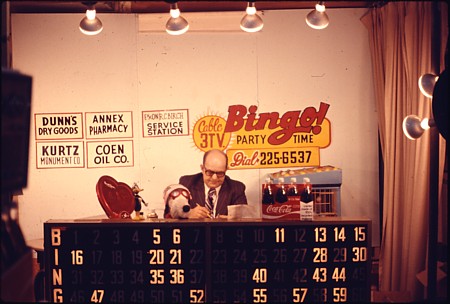
February
1973
About the same time, yet another system called Washington Channels also had a Bingo show. The host was the advertising salesman, Bill Wilson. Bill had been in the show business a long time — that's show business as in moving-picture shows — and at his local movie theater, he sometimes had built traffic by giving away free dishes. On Bingo, his sponsors included the Coen Oil Company (heating oil) and the Kurtz Monument Company (gravestones), so I'm not sure how well the show fared. It was off the air by the time I joined Washington Channels in 1974.
But in 1975, it was time for a revival. I was chosen as the host, because they wouldn't have to pay me anything extra. Fortunately, the show would be on only once a week. It was in prime time, Tuesday nights at 8:00. I was opposite Happy Days.
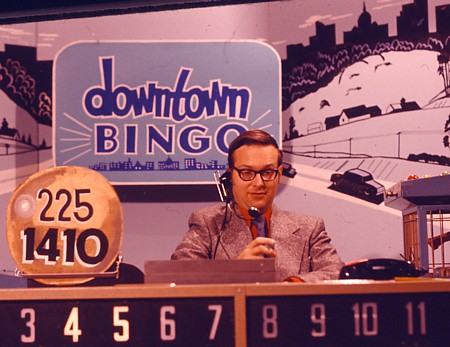
This was a very low-budget program. There were two cameras but no camera operators, so I sometimes wore the headset from one of the cameras. This allowed me to talk with Tim Verderber, who was my behind-the-scenes director and who made occasional walk-on appearances.
I came up with one innovation. In Marion, our viewers had sometimes complained that we were calling the numbers too fast and that they couldn't keep up. Or sometimes we'd get sidetracked and call the numbers too slowly, and then we'd have to start calling them fast in order to finish the show on time. In Washington, I worked out the show's format and determined that I needed to call a number once every 52 seconds. So I made an audio cassette with a beep on it every 52 seconds, plus extra beeps to indicate commercials, and I let that tape play beside me during the show. When the tape beeped, I called a number. Never had a complaint.
(Click here for more details about the Washington show.)
The show ran its course, and I eventually moved on to TV3 in New Kensington. When I got to that cable station, I was hardly surprised to find another set of Bingo equipment!
|
|
This time the program was hosted by Ellie Maher from the channel's traffic department. In New Ken, we usually played several games in the course of each day's show. Unlike my earlier experience, these games weren't "cover-all" Bingo but rather the traditional five-in-a-row. Or maybe we'd mix it up with an "H" game: all five B's, the center I, the free space, the center G, and all five O's would have to be covered to form the letter "H" in order for your card to be a winner. |
Miss Ellie was still calling numbers as late as 1985. Since then, I haven't heard anything about Bingo on TV.
But nowadays the big networks are cutting back their expenditures. Labor troubles with both writers and actors are threatening scripted shows, and we're seeing more "reality" TV, which is cheaper to produce. What could be cheaper than Bingo? Is Regis Philbin available to call the numbers? If not, perhaps Tom Baby could be persuaded to make another comeback.
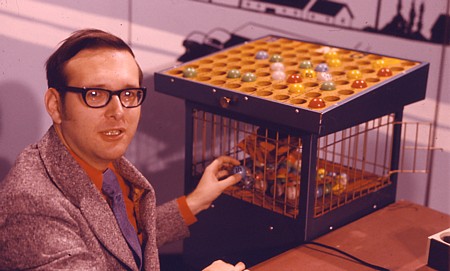
(Click here
for more recent developments on the network level.)

